Single or double honeycomb shades? What’s the difference between single cell and double cell? Does it matter when shopping for cellular shades? When should you use single cell shades and when do double cell shades make sense? The differences between the two are straightforward. Read out how they differ in structure and function, especially insulation and energy efficiency, in this post.
Cellular shades, also called honeycomb blinds, are fabric window coverings with a honeycomb construction that provides energy efficiency and a stylish look at the window. While both single cell and double cell shades provide energy-savings, noise-reduction, and versatility in light control, double cell shades perform better on these parameters.
The better performance of double cell shades is due to their higher R-value, from 3.25 (light filtering) to over 5+ (blackout). On the other hand, the R-value of single cell shades varies from 2.6 (light filtering) to 3.5 (blackout).
Based on their names, the immediate difference between single honeycomb (single cell) shades and double honeycomb (double cell) shades is obvious: Single honeycomb shades have a single layer of cells or pockets, while double honeycomb shades have two layers of cells or pockets.
In double cell shades, one row of insulating pockets is closer to the window, while the other row is closer to the room.
When it comes to functionality, double honeycomb shades serve the same purpose as single honeycomb shades, but to a greater degree. Both types block out more noise, temperature, and light than Roman shades, roller shades, mini blinds, faux wood blinds, curtains, and sheer shades.
Due to their double layered cellular structure, they provide better insulation than their single cell counterparts. Double-celled blinds are also awesome energy savers.
Key Points
- Both single and double cellular shades are great affordable window treatment choices for energy efficiency and light control.
- While single cellular shades do insulate your room, double cellular shades provide a higher level of insulation, while single cellular shades are a good choice for rooms that get a lot of sun’s rays.
- The key difference between the two types of honeycomb shades is the number of layers of fabric. Double cellular shades have two layers of pleated fabric, while single cellular shades have just one layer.
- Both types of cellular shades are available in a variety of colors, designs, lift options, sizes, and styles.
What are Honeycomb Shades?
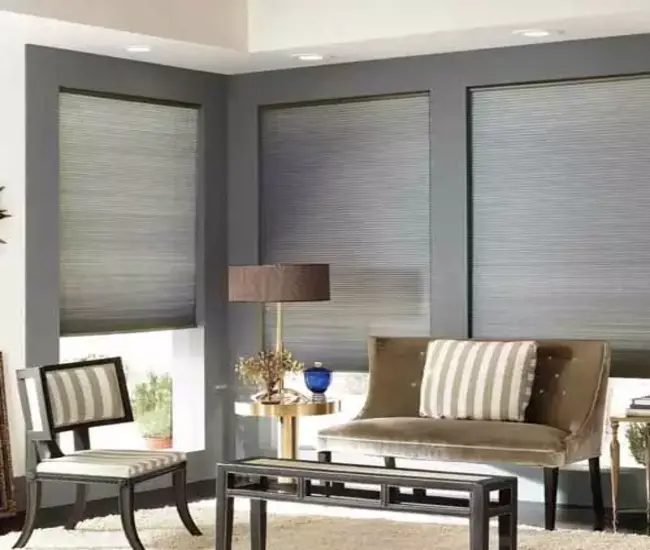
Also referred to as cellular shades or cell shades, honeycomb shades or blinds have a special honeycomb design with small chambers, sacs, or pockets, which trap air and act as an insulation barrier against the transfer of heat, light, and noise. When you look at them from the side, they have a honeycomb construction.
Durable honeycomb shades are available in two designs: (1) single cell shades and (2) double cell shades.
Single Cell Honeycomb Shades
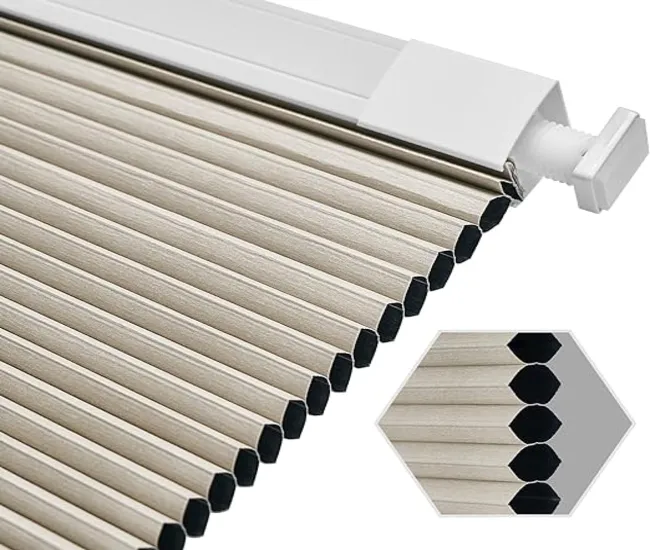
Single cell honeycomb blinds have a single row of hexagonal air-trapping pockets.
Pros
- Single cell honeycomb shades are made of a unique single pleat fabric.
- They are lightweight and easy to install.
- Easy to operate window coverings.
- Different varieties include silver backing in sheer, opaque, or opaque (blackout) fabrics.
Cons
- Lower R-value.
- Less insulation and energy efficiency.
Double Cell Honeycomb Shades
Double honeycomb shades look like a beehive with two rows of hexagonal cells running parallel to each other.
Pros
- The two rows of cells fit into one another to provide an added layer of sun protection, light filtration, and insulation.
- Higher R-value – up to 5 or 5+.
- Better insulation, synergy savings, and noise cancellation.
Cons
- A more expensive option.
- More difficult to clean.
When choosing between single and double cellular shades, consider your needs and the type of room you’ll be using them in. If you need a high level of insulation, double cellular shades are a great option. If you’re looking for a shade that’s easier to install and more affordable, single cellular shades are a good choice.
Differences between Single Cell and Double Cell Honeycomb Shades
What is the difference between single and double pleated shades? Here are structural, functional, and aesthetic differences between the two types of window covers.
Structural Differences between Single Cell and Double Cell Shades
One Piece/Two Pieces of Fabric
Single cell shades are window coverings with one thick piece of fabric that is divided into cells or pockets. These cells pop out to provide maximum energy efficiency. On the other hand, double cell variants have two thick pieces of fabric.
Single Layer/Double Layer
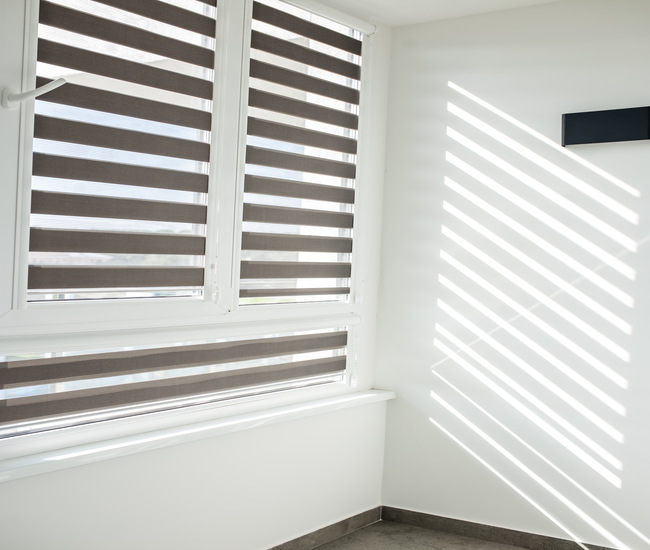
Single cell blinds have a single layer of honeycomb construction. On the other hand, double cell blinds have two layers of cells. That is why they are also called single-layered and double-layered honeycomb blinds.
Functional Differences between Single Cell and Double Cell Shades
Greater Energy Efficiency
With double cell shades, you get greater energy savings because of the better insulating effect of these shades.
Better UV Protection
Double cell shades block out more harmful UV rays compared with the single cell shades.
Better Noise Rejection
Double honeycomb shades keep a little more noise out than the single cell blinds.
Room Darkening Effect
With double cell shades, you get better light control and room darkening effect.
Aesthetic Differences between Single Cell and Double Cell Shades
Single cell honeycomb shades typically look more attractive, stylish, and sleek in appearance than their double cell variants.
Size Differences
Single cell shades are a lot bigger than their double cell counterparts. Single cell shades range in cell and pleat width from ⅜ inch to 2 inches. On the other hand, double cell shade come in much smaller sizes, i.e., less than ½ inch.
Advantages of Cellular Shades for Windows
Here are some of the benefits of cellular shades for windows:
Privacy and Light Control
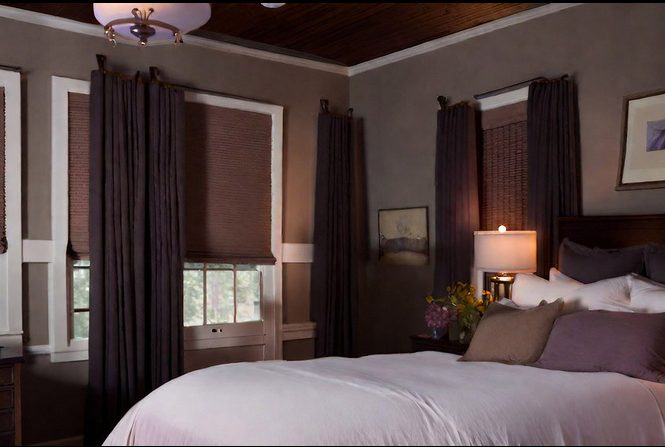
They are a popular option for light control and privacy. Light filtering double cellular shades let in plenty of light without sacrificing privacy and security, as they don’t allow view through.
Full Range of Light Control Options
Honeycomb shades come in different light control options, ranging from sheer and light filtering to room darkening and complete blackout. In addition, there are complete open and complete close options.
100% Customization
They can be customized for size (width and height) to match the unique decor of different types of windows, including tall windows, hexagons, arches, skylights, and angled windows.
Temperature Regulation
With extra soft cellular fabric, they block out the transfer of heat across the window opening, keeping the temperature in your home stable.
Child-Safety

Both single cellular and double cellular honeycomb shades are available with a cordless or motorization option that is CPSC-approved for child safety. So, they are a good choice for families with young children.
Noise Reduction
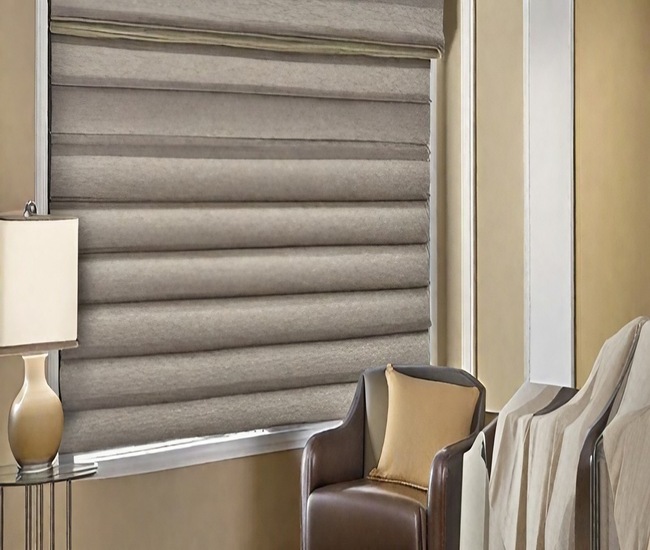
Each type of honeycomb construction allows you to keep external noise away for better sleep in your bedroom or kids’ room.
What are Disadvantages of Honeycomb Blinds?
Difficult to Clean

Honeycomb blinds collect dust and dirt in their empty cellular compartments. If you don’t dust or vacuum them regularly, it will become difficult to clean every cell, causing cleaning difficulties.
Shorter Life Cycle
Honeycomb shades have a shorter life cycle, i.e., 5 to 7 years. On the other hand, Roman shades, draperies, and wood shutters last for 5 to 8 years, 8 to 12 years, and 10 to 15 years, respectively.
Single vs Double Cells Shades: Which One to Choose for Your Settings?
If you’re considering cellular shades for your home, office, or some other residential or commercial building, you should know the difference between single and double cellular shades.
Both types of cellular or honeycomb shades have their own benefits, so it’s important to choose the right one for your needs. Here are a few practical considerations to have a better idea of which type of cellular shade is right for you.
If you face extreme weather or a lot of noise pollution in your area, double honeycomb shades are a better choice. The additional layer of cellular fabric provides more light-blocking and temperature regulation capabilities. Double honeycomb construction prevents hot and cold air from passing through the windows.
If you have a small window with shallow depth, single cell shades will be a better choice. With a ⅜ measurement, they work well for smaller windows and shallower window openings.
Double cell honeycomb shades work best in rooms, such as a bedroom or an office, where you want to block as much light and sound as possible. To install them in your bathroom or kitchen, you can choose smaller sizes.
FAQs
Are single or double cellular shades energy-efficient?
Double cellular shades are more energy efficient than their single-cell counterparts, leading to higher savings on energy bills. The advanced double cell design offers better temperature control, adding comfort to your home throughout the year.
What is the R value of double cellular blinds?
While typical horizontal blinds have an average R-value of 2.5, double cellular shades have higher R-value, ranging from 3.25 to 5.0, providing much better insulation and energy efficiency. Double cell, double pane blackout cellular shades have an amazingly high R-value of 5.8!
How energy-efficient are honeycomb blinds?
Cellular shades offer excellent energy efficiency, particularly in extreme climates. According to the Department of Energy, tightly installed cellular shades save up to 40% on heating costs in winter and up to 80% on cooling costs in summer compared to scenarios without any window shades.
Honeycomb blinds offer aesthetic, functional, financial and eco benefits. The honeycomb design traps air and acts as an excellent insulator, significantly reducing the need for heating and cooling and lowering your monthly energy bills.
What are the drawbacks of cellular shades?
- The biggest drawback of both single-cell and double-cell cellular shades is that their air-filled pockets collect dust and can stain over time.
- With dust and dirt accumulated in the cells, they become a bit difficult to clean. If not vacuumed regularly, they become difficult to clean.
- For thorough cleaning, you need to clean each cell from inside.
- Both single cell and double cell shades are less durable than window shutters.
Need More Help?
Still unsure if you need to buy single cell or double cell honeycomb shades for your needs? Get in touch for help now! Use 24/7 live chat or give us a call at (800) 863-6109 to contact our design experts for custom or DIY window treatment solutions.
